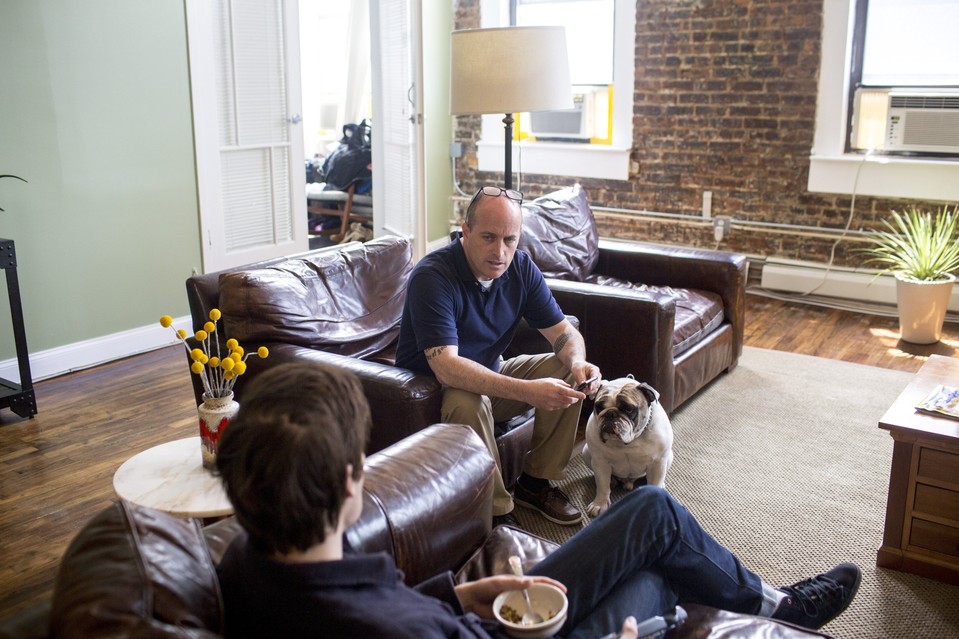MEDIA


GOOD DAY NY INTERVIEW
For Alcoholics in Recovery, a Sober Friend for Hire
To read original article on wsj.com click here.

May,2015
Tommy McAlinden is a sober companion.
~a friend for hire catering to alcoholics and other addicts in early recovery.
Mr. McAlinden, a laid-back 48-year-old, covers his tattoos with preppy blue blazers and khakis.
His first client, a 23-year-old from a prominent New York family, was referred by Williamsburg House, the upscale, $12,000-a-month private halfway house in Brooklyn that Mr. McAlinden managed after retiring from his job with the city. It turned out to be a typical case. Mr. McAlinden squired his charge around town for three months, taking him to lunch, recovery meetings and classes at NYU.
Mr. McAlinden typically introduced himself as his client’s friend. At a private golf club, he switched roles. “The word ‘assistant’ goes a long way,” he says.
Even more gratifying—five years later, the client is still clean.
Not every case goes smoothly. Mr. McAlinden once spent a month living on the Connecticut estate of a retired hedge-fund director. They ran errands, played golf and went to recovery meetings.
Mr. McAlinden, who tried feigning an interest in the markets, had a hard time getting through to his charge. “He was incredibly wealthy and very intelligent. Guys like that have a hard time admitting their life is in trouble,” he says. Six months later, the client was drinking again.
Some clients even sneak around his watch. One hid pills in his leg cast. Another shoplifted cough syrup from the drugstore.
Mr. McAlinden, who subjects his clients to urine tests and pat downs, says he understands—he has his own recovery story. He grew up drinking at Dooley’s, an Astoria bar where his dad worked as a bartender. By his mid-20s he’d been arrested in a drunken brawl with a cabbie and threatened with the loss of his job. Rehab didn’t work.
It wasn’t until 1994 that he met a solid mentor at a recovery meeting and got sober for good. “I just needed some guidance, I couldn’t do it by myself.” he says.

Tommy McAlinden’s sober anniversary is posted on a calendar.
Photo: Natalie Keyssar for The Wall Street Journal
Sober companionship is a fledgling field. There are perhaps two dozen working in New York City, earning $500 to $1,500 a day, according to Mr. McAlinden and Williamsburg House founder Joe Schrank.
The demand is clear: Wealthy folks from around the globe jump at the chance to get sober in the Big Apple.
Whether the service helps long-term is another question. There aren’t any published studies gauging its efficacy, says Emily Feinstein, director of health law and policy at the National Center on Addiction and Substance Abuse at Columbia University. Nor are there any regulations associated with the profession. Sober companion is a title open to anyone.
Ms. Feinstein worries about the potential for manipulation. A sober companion commanding a high rate may have little incentive to establish a client’s long-term independence, she says. “If it helps you recover, great,” she says. “But buyer beware.”
Some of Mr. McAlinden’s clients credit him for their recovery. Hayden Brown, a 17-year-old high school senior, says that while living at a private sober house to treat his pot addiction last summer, he relapsed twice before Mr. McAlinden entered the picture.
For two months, they bunked in the same room, attended meetings and went to hockey games. Mr. Brown says he hated losing his freedom, but the relationship taught him good habits. He watched Mr. McAlinden fulfill his commitments, participate in recovery groups and care for his 9-year-old daughter. “Tommy taught me to live a sober life,” says Mr. Brown.
His mother, Mary Brown, says neither she nor her husband had experience with addiction; they needed a veteran to guide their son. “Tommy was a person who’s been through the woods and knows how hard it is,” she says.
Another client, a film director who asked to remain anonymous, said he happily pays McAlinden $1,000 a day to accompany him at film festivals around the country. With a sober companion by his side, he’s never dogged by the question of whether to drink at alcohol-fueled cocktail parties.
And he’s never alone. “Tommy’s a fun guy,” he says, “I think of him more as my friend. My friend I pay for.”
Write to Anne Kadet at Anne.Kadet@wsj.com
Click below to listen to Thomas on Empire Radio Now
Thomas McAlinden – 3 11 17 Addiction Treatment | Empire Radio Now
Contact:
Tommy McAlinden
ReleaseID: 60001982
"*" indicates required fields


